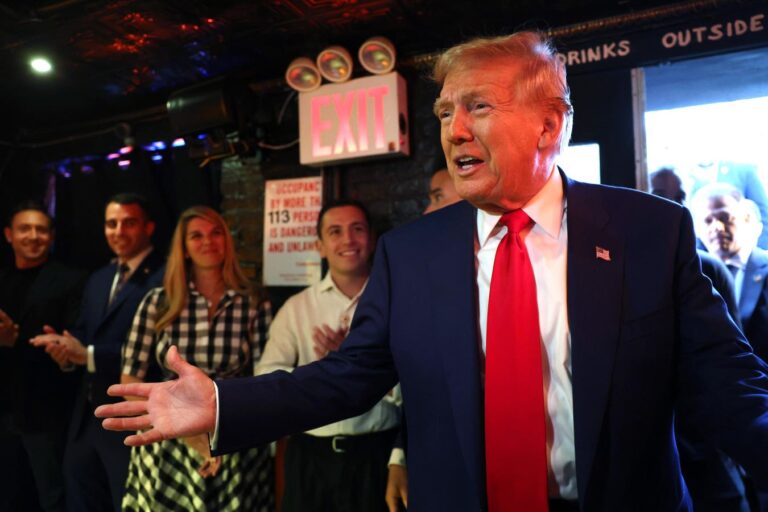NEW YORK, NEW YORK – SEPTEMBER 18: Republican presidential candidate, former US President Donald … (+)
Getty Images
In 2025, Bitcoin will no longer be just a niche investment, but a geopolitical asset. From Washington to Zurich, governments and central banks around the world are engaged in discussions about their role in national reserves. Bitcoin has emerged as a challenger to traditional reserve assets such as gold and the US dollar, and has the potential to reshape the global financial order.
The debate surrounding Bitcoin has changed under the Trump administration. Once a skeptic, President-elect Donald Trump has expressed support for bitcoin as a strategic asset and outlined plans to create a U.S. bitcoin reserve to increase economic stability.
The administration has suggested that holding Bitcoin can help stave off inflation and a weak dollar. The proposal is being debated in Congress, with supporters like Sen. Cynthia Lummis arguing that since Bitcoin’s supply is limited, adding it to the national reserve would be ideal. are. Although there are still skeptics, the momentum is undeniable.
Switzerland is also considering a similar move. The Swiss National Bank, known for its neutrality and financial expertise, is considering adding Bitcoin to its reserves alongside gold. Thanks to a referendum, Switzerland could soon become the first country to officially hold Bitcoin as a reserve asset. The move is in line with Switzerland’s spirit of innovation and financial independence and could set a precedent for other countries.
domino effect
When one country adopts Bitcoin, other countries may feel compelled to follow suit to avoid being left behind. Fear of missing out has a powerful influence not only among individual investors but also among governments. In this high-stakes game, early adopters can gain a strategic advantage and solidify their position in a changing global financial system.
The strategic reserve debate mirrors the 20th century nuclear arms race, both in its destructive potential and competitive nature. Countries that do not take action risk being marginalized as Bitcoin permeates their financial systems.
History provides guidance. Countries that recognized the value of gold early on solidified their place in global finance. Oil then became a key asset that shaped geopolitics. Bitcoin, with its digital scarcity and global liquidity, could be next.
global shift
As Bitcoin grows in importance, discussions about its role in national reserves are emerging beyond the United States and Switzerland. Countries such as Germany, Hong Kong, Russia, Brazil, and Poland are taking steps to explore Bitcoin as a strategic asset, each with their own economic and political motivations.
In Germany, influential figures such as former finance minister Christian Lindner have suggested that the European Central Bank and the Bundesbank would consider Bitcoin to reduce their dependence on the US dollar.
Hong Kong Legislative Councilor Wu Jie-zhuang has advocated integrating Bitcoin into the city’s financial reserves, with the aim of increasing economic resilience and stability. Wu said incorporating Bitcoin into national reserves is not a new idea, noting that some US states and small nations are already diversifying their assets with Bitcoin. “If major economies proactively include Bitcoin in their strategic reserves, its value will stabilize and encourage more countries to follow suit and reduce their holdings of traditional assets,” Wu said. “Prices will fall and the government’s fiscal reserves will shrink.”
Russia has started using Bitcoin and other digital currencies for international transactions as part of a strategy to circumvent Western sanctions and reduce dependence on the US dollar, Finance Minister Anton Siluanov said. The move signals Russia’s efforts to diversify its financial strategy and regain economic autonomy in the face of global financial pressures. Russian companies have begun using domestically mined Bitcoin for foreign trade, and President Vladimir Putin has expressed support for digital currencies as an alternative to the traditional dollar-based system.
In South America, Brazil has introduced the Sovereign Strategic Bitcoin Reserve, also known as RESBit, with the aim of allocating a portion of its international reserves to Bitcoin. Brazil aims to diversify its national reserves and position itself as a leader in financial innovation while increasing its economic independence.
Poland is also considering establishing a strategic Bitcoin reserve in order to diversify its financial assets and establish itself as a leader in digital finance. Presidential candidate Sławomir Mentzen proposed the creation of a reserve fund to transform Poland into a hub with favorable regulations, low taxes and cooperative involvement of banks and regulators.
Cultural and strategic influence
Bitcoin is more than just an economic asset. It symbolizes freedom and decentralization. The adoption of this system by countries demonstrates a commitment to innovation and independence, challenging even authoritarian regimes to embrace its principles.
Bitcoin’s appeal as a reserve asset continues to grow as central banks face mounting pressures from inflation to debt crises. Although the Bank for International Settlements has placed limits on crypto exposure, demand for decentralized reserves continues.
The Trump administration, Switzerland, and other countries are exploring Bitcoin reserves and building new financial frameworks. The game is on and whoever acts first may gain a permanent advantage. For hesitant governments, the message is clear. Adapt to a world where Bitcoin dictates the rules or risk being left behind.
These developments demonstrate the need for countries to move away from complex and controversial financial tools and seek alternative paths to economic independence. Nation-states now see Bitcoin as a way to strengthen their sovereignty, stave off inflation, and signal progress. In 2025, the question is no longer whether Bitcoin will become part of national reserves or shape geopolitics, but how central it will play in future economic strategies. .


